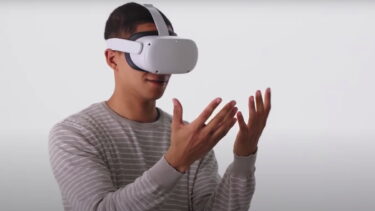Unity brings platform-agnostic hand tracking for VR developers

An extension for the Unity engine allows the implementation of hand tracking on hardware including Meta Quest via OpenXR.
Developers using the Unity engine for hand tracking in virtual reality have a new option. The "XR Hands" package enables access to hand-tracking data according to the OpenXR standard. Meta Quest (2 & Pro) and Microsoft's Hololens 2 are supported so far, and other OpenXR platforms with hand tracking are to follow.
In the case of the Quest 2 (review), developers no longer need Meta's OpenXR backend for hand tracking. The previous Oculus integration was based on OpenXR but used a proprietary extension and a different joint arrangement than the standard.
OpenXR hand tracking for Quest (2 & Pro) and Hololens
The "XR Hands" package relies entirely on OpenXR and is therefore compatible with Unity packages like the "XR Interaction Toolkit". So far, "XR Hands" is still in pre-release version 1.1 for OpenXR.
XR Hands package doesn’t implement hand tracking itself but it utilizes platform plug-in providers that have been updated to use XRHandSubsystems.
AdAdℹ️ If you want to check it out, simply update your manifest.json with the 2 lines available in the YouTube video description.
— Dilmer Valecillos (@Dilmerv) January 18, 2023
Interested parties should add the package manually to the project's manifest. The package does not implement hand tracking, explains VR developer Dilmer Valecillos. Instead, it relies on appropriately updated plug-ins.
Unity's Staff Research Engineer Eric Provencher points out that an update to OpenXR 1.6.0 would also be useful. He also reminds developers that some hand-tracking extensions should be activated in the OpenXR menu.
Note as well - you'll probably need to manually update to OpenXR 1.6.0 in your manifest, and once all is active, be sure to activate necessary extensions in the OpenXR menu. pic.twitter.com/FRFn5sdkAO
— Eric Provencher (@prvncher) January 11, 2023
Hand Tracking 2.1 for Quest (2 & Pro)
Meta has also recently noticed progress in hand tracking with Quest headsets. The proprietary programming interface in version 2.1 reportedly suffers from less frequent tracking crashes. The software also finds the "lost" hand faster after a tracking loss.
There are also improvements in precision, position prediction, and the pinch gesture. Hand Tracking 2.1 was introduced with Quest System Update v47. Supported applications should automatically benefit from the improvements, Meta said.
Note: Links to online stores in articles can be so-called affiliate links. If you buy through this link, MIXED receives a commission from the provider. For you the price does not change.